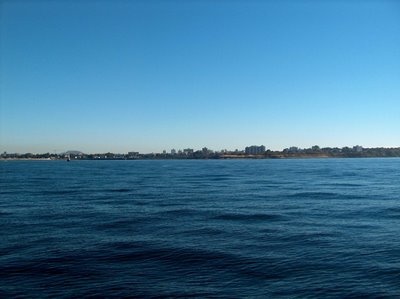 SCHOOLBOYS WITHOUT MAPS
SCHOOLBOYS WITHOUT MAPSThe following passage is from Life In A Medieval City by Joseph and Frances Gies, p.162. It describes some of the education a potential cleric, one headed for religious orders, in a University school in Paris might receive:
“As part of his geometry course he may acquire some rudiments of geography, studying a map of the world that shows the circular earth composed of three continents equal in size—Asia, Africa, and Europe—separated by narrow bands
of water. East is at the top, Jerusalem at the center. In various places on the map one may marvel at dragons, sirens, men with dogs' heads, men with feet turned backward, men with umbrella feet with which they protect themselves from the sun while lying down. It is not a map for finding one's way, but for illustration and edification. More practical and less picturesque maps exist—mariners' charts produced by sailors armed with the newly introduced compass and astrolabe, accurately delineating coastlines, capes, bays, and shallows, and locating ports of call and places for watering and victualing so that a navigator can find them easily. But the schoolboy and his teachers know nothing of such maps.”
The topsy-turvy part of the current picture is that in America, the most religious country in the world (following just behind those many Moslem ones), the majority remain naïve schoolboys, reading from an ancient book (or map, if you will) who have no knowledge of the real world as mapped so correctly by the mariners among us, so they believe in fairy tales and people with umbrellas on their feet, so to speak.
(Photo: Coming into Victoria)
ANTHROPOMORPHIZING AN HYPOTHETICAL SUPER BEING
As some of you know, many cognitive scientists are finding evidence that suggests that language and consciousness and/or tool making may have emerged in the human species at about the same time. So the idea of a god who makes or creates things is an anthropomorphizing projection about god which suggests that early humans were projecting what they knew about themselves and valued about themselves into their imaginative conceptions of a god. Of course they needed some idea of god because there were still O-so-many other mysteries surrounding them. In fact, I’d say that everything that human beings still do not know anything about, which science has not yet uncovered, is what those inside the darkest, most clueless brains still call god to this day.
However, the earliest of our language speaking species did know about creating things like tools and art on cave walls. So—what a good place to start when it came to making up a god, and in writing a myth like Genesis, eh? I’m sure I’m not the first person to suggest this idea, but I don’t know where else it’s found. If anyone knows, please let me know. Thank you.
No comments:
Post a Comment